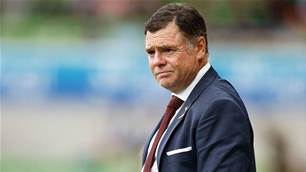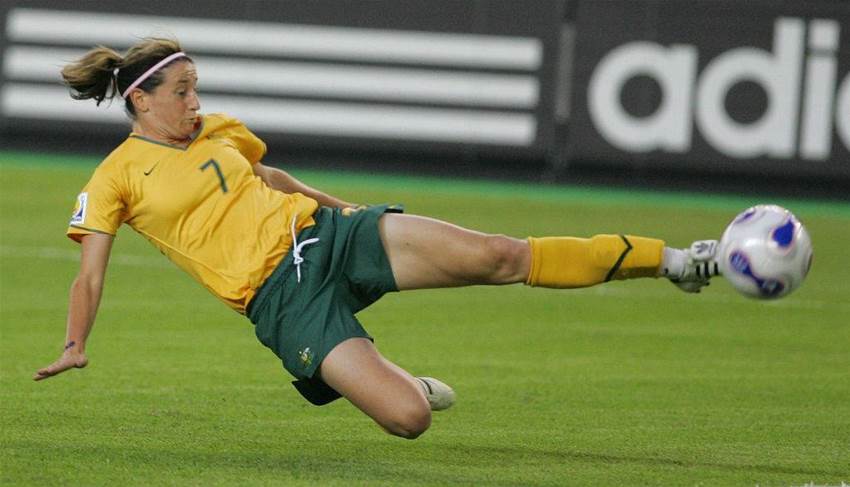The FFA Hall of Fame first started in 1999, since then 245 people have had the honour of being inducted, from players to coaches to administrators to anyone that has made a significant contribution to Australian football over the last 140 years. The class of 2020 has not yet been announced.
2020/21 marks the Centenary of Women’s Football in Australia, so it seems appropriate to look at five possible inductees who have contributed to women’s football over the last 99 years, who may one day take their place alongside the games immortals.
1. Joe O'Connor -
Considered by many as the Godfather of women's football in NSW, O'Connor is the husband of 2001 inductee Pat O'Connor.
Although a solid footballer himself, his coaching of women in NSW and his contribution to growing the women's game in Australia is something that should never be forgotten.
O'Connor coached Sydney Prague, St George and NSW women in the 60s and 70s. He was also the coach of the 1975 Australian XI team who played at the inaugural AFC Women’s Championships in Hong Kong where they finished a respectable third.
Along with Pat, Joe helped start the NSW Metropolitan Ladies Soccer Association (MLSA) in 1967 and also the Australian Women’s National Championships in 1974.
Under O’Connor, NSW won the 1974, 1976 and 1977 National Championships.
O'Connor had a hand in developing the first official Matilda in Julie Dolan, who was with him at St George, NSW and the 1975 Australian XI.
Dolan, who was inducted herself in 1999, was full of praise for her former gaffer:
“Joe should definitely be recognised. He was amazing in what he did to develop women’s football.”
A number of other former Matilda legends have called on FFA to recognised O’Connor and one day it may happen.
2. Angela Iannotta -
Hailing from Albury, Iannotta became the first Australian in history to score a goal at a World Cup when she netted against China in 1995. Although injury curtailed her career, she still managed 33 caps for Australia appearing in two World Cups.
She narrowly missed out on selection at the 2000 Sydney Olympics.
Iannotta also became the first Australian to win an Italian top flight title when she won the 1995 Scudetto with ACF Agliana in 1994/95.
She also played domestically in Japan and Australia.
Her legendary strike in 1995 for the Matildas was a pivotal moment for Australian football. But her collective achievements in Europe, Asia and for the national team throughout her career despite injury makes her an icon of the game.
At ACF Agliana, Iannotta played with legendary Italian Carolina Morace who spoke highly of her Australian team mate.
“Angela Iannotta was a very fast player and good striker,” said Morace. “She was always a happy person, very passionate about football and sports in general.“
Iannotta was also very popular with her Australian team mates as well who lauded her speed and ability to create and score goals.
A worthy inductee into the Hall of Fame and hopefully one day it happens.
3. Heather Garriock -
There is no doubt Garriock will be in the Hall of Fame one day. A 130 game career which included being part of the 2003 OFC Women's Championship and 2010 Asian Cup triumphs.
Garriock was also successful on the domestic scene in Australia and Europe. She won two W-League titles with Sydney FC and also a WNSL championship with NSW Sapphires.
In Europe she won the Swedish Damallsvenskan with LdB FC Malmo and also the Svenska Supercupen as well as a Danish Cup with Fortuna Hjorring.
The 2003 Dolan Medallist also has coached at the W-League level.
The "wildchild from Campbelltown" as she was described by a former coach is an inspiration to many women and will undoubtedly one day be a successful administrator in the game.
The Matildas first ever women’s coach and an FFA Hall of Famer herself in 2007, Trixie Tagg, endorsed Garriock to join football’s immortals.
“For her amazing contributions as a proud Matilda, as well as being a wonderful role model for girls and women who aspire to become Coaches, she deserves her place,” said Tagg. “I also love her analysis of matches.”
4. Jean Campbell -
Many would scratch their head at this name. Well who is she?
Campbell played in the first public women’s game on 24 September 1921 for North Brisbane against South Brisbane. This was somewhat of a representative game.
Despite only being 16 she captained the North siders and was a stalwart in defence according to newspaper reports of the day. She even scored a penalty as North Brisbane won 2-0.
Campbell played a key role as an administrator too in Queensland women’s football. This was at a time when women faced ridiculous barriers to simply play. For a teenager to fight that is an amazing effort.
While a lack of accurate records makes it hard to point out her key achievements, her contributions to the history of women’s football deserve to be recognised.
5. The 1975 Australian XI -
While a number of individuals from the 1975 team including Pat O'Connor, Julie Dolan, Trixie Tagg, Cindy Heydon and Connie Selby have already been inducted in their own right, it would be appropriate as we celebrate the Centenary of women's football in Australia for this pioneering team to finally be recognised collectively as a group.
The 1975 Australian XI was made up of players from NSW, and after being sanctioned by the Australian Soccer Federation (the national governing body at the time), they played in the inaugural AFC Women's Championships (a tournament of nations) where they came third.
This team has never officially been capped by Australia and has never been formally recognised by Australian footballing authorities since. Over the years the team has been unfairly mocked as being ‘just from NSW’, however the reality is they played in the first Asian Cup and represented our nation with great distinction.
This team is widely recognised as setting the wheels in motion to show Australian women could compete on the international stage.
Many of these women won State and National titles and were rightly given the chance to represent their country.
The 1965 Socceroos who competed in Australia's first ever World Cup qualifiers were recognised in 2015 during the Hall of Fame ceremony, so recognising a team at this event is not without its precedence.
A number of former Matildas have given support to this team.
Shelley Youman, who played 24 times for Australia, acknowledges the team was only from NSW but sees the significant role they played.
“For me, every player counts and I know that if I had played in 1975, I would like to be counted,” admits Youman. “It's tricky but these girls are part of our history.”
2010 Hall of Famer Joey Peters, one of Australia’s most celebrated footballers, underlined the important role these women played in getting the ball rolling.
“... the point is these women should be recognised, valued and included as much for their place in history as the rest of us... one thing is for sure, it would mean a lot to those women.”
Even some members of the first official Matildas team in 1979 have called on FFA to recognise this team.
Forty five years has been far too long to acknowledge these pioneers.
The 1975 Australian XI was made up of the following ladies:
Pat O’Connor (captain), Christel Abenthum, Gundy Zarins, Lynn Everett Miller, Kim Coates, Julie Dolan, Cindy Heydon, Stacey Tracy, Sue Larsen, Sue Taylor, Lynn McKenzie, Connie Selby, Sue Binnes, Trudy Fischer, Vicky Kohen and Trixie Tagg. Coach: Joe O'Connor.
Related Articles
.jpeg&h=172&w=306&c=1&s=1)
'Never-say-die' Western Utd primed for Mariners battle

Aloisi, Veart deny A-League Men wooden spoon motivator
.jpeg&h=172&w=306&c=1&s=1)












